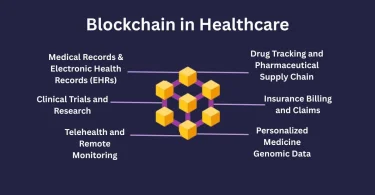Exploring Quantum Computing:
It is a field within computer science that impose the rules of quantum theory to investigate the behaviors of energy and matter at extremely small scales, such as atoms and subatomic particles.
Quantum Computing: Harnessing Power of Subatomic Particles for Revolutionary Computing.
Tiny particles like electrons or photons are used in it, they are called subatomic particles. These particles allow for the existence of quantum qubits, which possess the remarkable ability to be in multiple states simultaneously, representing both 1 and 0 concurrently.
Diverging from that, conventional computers depend on binary signals, which can only represent either 1 or 0, to store information in bits. This binary nature imposes restrictions on their processing capabilities, setting them apart from the immense potential offered by quantum computing.
Quantum Computing: Harnessing Quantum Phenomena for Exponential Power.
This technique utilizes the process described by quantum physics to evolve a new method for quantum computation.
It also includes the use of qubits, which can exist in a multidimensional state, unlike traditional computer bits that can only be 0 or 1.
Quantum computing exhibits exponential growth in computational power with the addition of more qubits, while classical computers can only achieve linear growth by adding more bits. This fundamental difference in scalability distinguishes quantum computing and its potential for significantly advanced computational capabilities.
Quantum Computing: Unleashing Revolutionary Power and Attracting Industry Giants.
Quantum computing, which emerged in the 1980s, has revolutionized the field of computational problem-solving. Scientists discovered that certain problems can be efficiently tackled using quantum algorithms, surpassing the capabilities of classical computing methods.
The Unique Capabilities of Quantum Computing in Multidimensional Problem Solving.
One of the defining features of quantum computing is its ability to simultaneously explore numerous possibilities and extract potential solutions for complex challenges. In contrast to classical computers that rely on binary bits (0s and 1s) for information storage, quantum computers employ qubits. These qubits exist in a quantum state that encompasses multiple dimensions, allowing them to represent both 0 and 1 simultaneously.
Quantum Computing: Pioneering the Future of Technology.
The remarkable computing potential of quantum technology has captured the interest of industry giants. These leading companies recognize the transformative impact of quantum computing and have eagerly embraced its possibilities.
With a projected market size that reflects its exponential growth, quantum computing is poised to revolutionize various industries. Its capacity to solve complex problems, harness vast computational power, and explore multiple states simultaneously positions it at the forefront of technological advancement.
As quantum computing continues to evolve and mature, it holds the key to unlocking a new era of limitless possibilities. From advancements in healthcare and finance to breakthroughs in aerospace and security, the potential applications of quantum computing are boundless. With each passing day, we inch closer to a future where quantum technology will shape our lives in unprecedented ways.
Revolutionizing Industries with Quantum Computing: Unlocking Innovation and Transformation.
For instance, in the realm of security, quantum computers can enhance secure information sharing and improve the effectiveness of radar systems used for detecting missiles and aircraft.
Additionally, quantum computing can contribute to environmental conservation by utilizing chemical sensors to monitor and maintain water cleanliness. These examples highlight the transformative possibilities that quantum computing offers, paving the way for advancements and innovative solutions in the future.
Harnessing Quantum Computing:
Quantum computing presents numerous advantages across multiple sectors. Specifically, in the financial domain, it has the potential to revolutionize the way financial institutions create investment portfolios, catering to the needs of both individual and institutional customers, resulting in enhanced effectiveness and efficiency. Additionally, quantum computing can support the development of better trading simulators and enhance fraud detection measures.
In the healthcare industry, quantum computing has the potential to drive advancements in drug development by enabling more accurate modeling and simulation of molecular interactions. It can also contribute to genetically-targeted medical care and facilitate breakthroughs in DNA research.
In terms of online security, quantum computing can play a crucial role by designing improved data encryption methods that are resistant to attacks from quantum algorithms. Furthermore, quantum technologies, such as utilizing light signals, can enhance intruder detection in systems, bolstering online security measures.
In the field of transportation, quantum computing can be utilized to design more efficient and safer aircraft through advanced optimization algorithms. It can also enhance traffic planning systems, improving overall transportation efficiency and reducing congestion.
Bottom Line:
In conclusion, quantum computing holds tremendous potential to revolutionize the field of computer science and impact various industries. By harnessing the unique properties of quantum theory and utilizing qubits, quantum computers can process information in ways that surpass the limitations of classical computers. The ability to explore multiple states simultaneously and sift through vast possibilities opens up new avenues for solving complex problems and challenges. From finance and healthcare to security and aerospace, quantum computing offers promising benefits, including more efficient algorithms, improved data encryption, and advanced scientific research.



